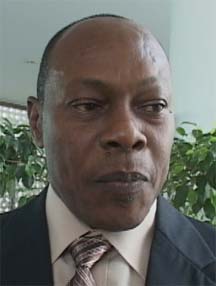Art critic Al Creighton has described National Communication Network’s ban on the finalists in this year calypso competition as a “…trivial and unnecessary act that achieves nothing…” which blemishes the government’s record and did “what it sought to undo”.
However, he said, there is need to address the fall-off in artistic skills and popularity of the genre of music as there are already problems with the Guyanese calypso that is supposed to be at the core of the festival and a deep-rooted national tradition.

(GINA photo)
Writing in his ‘Arts on Sunday’ column in the Sunday Stabroek, Creighton, who is also Dean at the University of Guyana, dedicated a large section to praising this year’s Mashramani celebrations which he said was “somehow flawed by one minor blemish – a little event that triggered off multiple problems.”
According to Creighton, comments have particularly been made in 2011 and 2012 about “the poor quality of compositions and the questionable state of this art form in Guyana.” He said there has been talk at a ministerial level about action to revive this musical form adding, “We also commented on the preponderance of attacks on the government noted in 2011 and 2012, which passed without making any mark.”
He pointed out that although some of the calypsos were very popular in performance at the competition and were played on the radio, they made “very negligible public impact and were unheard among songs that were really popular across the country, like Mahindra Ramkellawan’s “Dem A Watch Meh”.
“The prohibition, then, has only served to give prominence to innocuous tunes that would have passed unnoticed. It blemishes the government’s record, and in fact does what it sought to undo,” Creighton wrote.
He said the ironies involved in this are very much like those accompanying the history of censorship and the banning of literature and art.
He likened Minister Robeson Benn’s objection to Lester ‘De Professor’ Charles’s winning song to that of a problem in Barbados in 2003. In that country, controversy had erupted over a calypso that was withdrawn from the final of the Crop-Over festival because of the content of its lyrics that were not vetted as they should have been. The organisers argued that they had to protect themselves against lyrics that were libellous or could cause offence.
He said while Guyana “is still far from those extreme forms of censorship” as a democracy even this form is not tolerated and the government will hurt no one but itself for attempting it. “If [persons at] NCN took it upon themselves to impose a ban no one will believe instruction did not come from the government, so if even for those reasons, it is ill advised,” he wrote.
According to Creighton, the problem with Guyanese calypso is larger than that and judging from the Minister of Culture Frank Anthony’s remarks, the government is aware of that.
“There is a need to address the fall-off in artistic skills and popularity, and this has been already placed on the agenda for dialogue with the stakeholders,” he noted.
He said the minister’s comment about the ban took the right approach, which was that the Culture Ministry had already cleared the calypsos without restriction. It had appointed a panel of judges and accepted their decisions.
“It is a mystery then, why the government as a whole has not taken the same approach. One still hopes they will be at one with those sentiments and take steps to correct the grave error that was committed at the radio station. Surely they can set NCN right. Then they should seriously embrace whatever measures are to be put in place to deal with the large question of the survival and future of the art form,” he concluded.
While NCN is yet to publicly explain why a ban was imposed on the songs, the catalyst was Minister Benn’s action of going into the radio station while De Professor’s song was being played and demanding it be taken off air. Benn has defended his action saying that the song was offensive and ought not to be played on “government radio” but he has no issue if it is played elsewhere. Hours after Benn’s action a notice was posted up at NCN instructing that all the songs should not be played until further notice by order of management. The notices were removed following public outcry and NCN’s acting Chief Executive Officer Michael Gordon has repeatedly declined to comment on the issue.
The management of NCN met the some of the calypsonians–including De Professor–and during the meeting maintained that the songs were not banned and that only the monarch’s song, “God Don’t Sleep” was “restricted”. Told by the other singers that they were not hearing their songs on the radio the management indicated that while they might be listening to one station the songs might be playing on one of the two other stations it controls.





